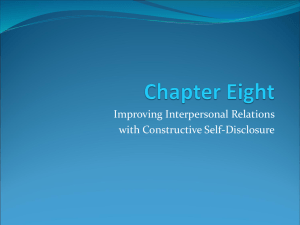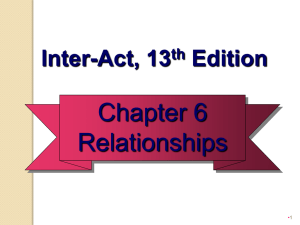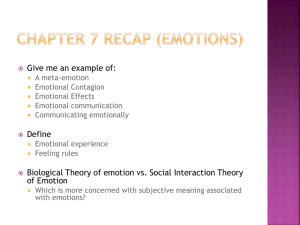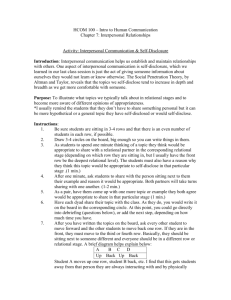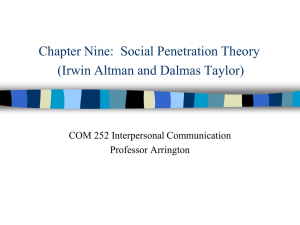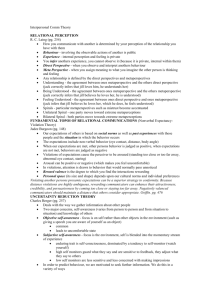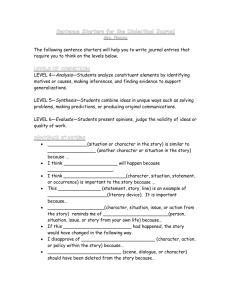Interpersonal Relationships (Cont
advertisement
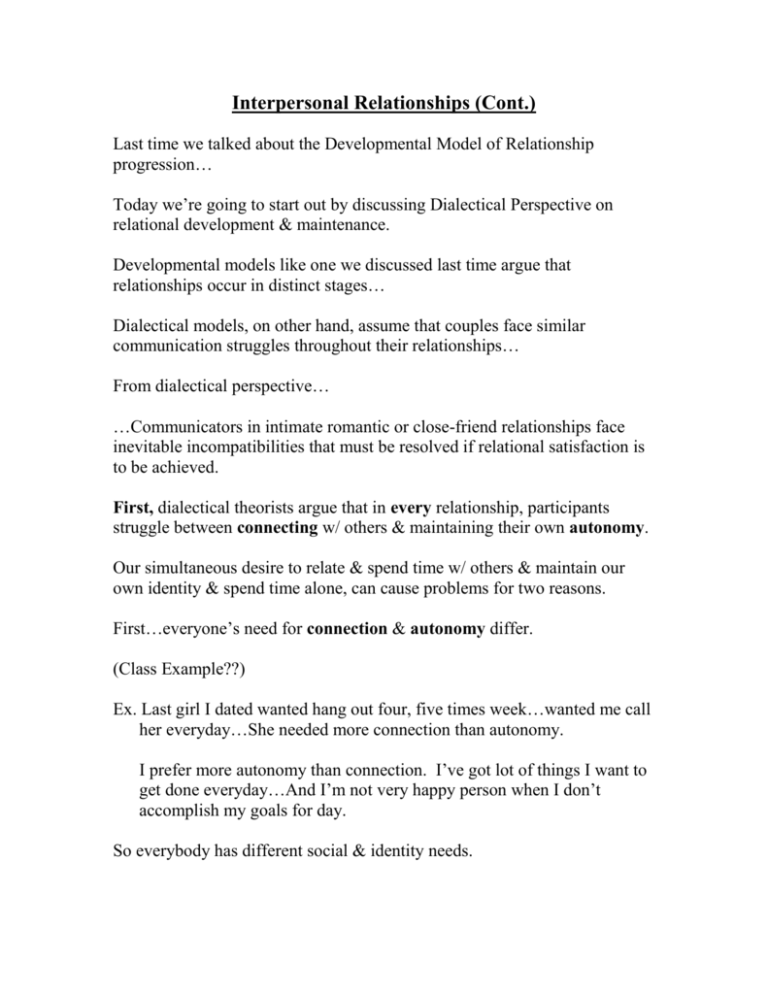
Interpersonal Relationships (Cont.) Last time we talked about the Developmental Model of Relationship progression… Today we’re going to start out by discussing Dialectical Perspective on relational development & maintenance. Developmental models like one we discussed last time argue that relationships occur in distinct stages… Dialectical models, on other hand, assume that couples face similar communication struggles throughout their relationships… From dialectical perspective… …Communicators in intimate romantic or close-friend relationships face inevitable incompatibilities that must be resolved if relational satisfaction is to be achieved. First, dialectical theorists argue that in every relationship, participants struggle between connecting w/ others & maintaining their own autonomy. Our simultaneous desire to relate & spend time w/ others & maintain our own identity & spend time alone, can cause problems for two reasons. First…everyone’s need for connection & autonomy differ. (Class Example??) Ex. Last girl I dated wanted hang out four, five times week…wanted me call her everyday…She needed more connection than autonomy. I prefer more autonomy than connection. I’ve got lot of things I want to get done everyday…And I’m not very happy person when I don’t accomplish my goals for day. So everybody has different social & identity needs. -However…our autonomy needs change over course of our lives & over course of relationships. So if my last girlfriend & I had kept dating… She might have wanted more autonomy as relationship progressed… And I might have wanted more connection. The Second dialectical tension that occurs in every relationship is finding balance between Predictability & Novelty. On one hand, we need to be able to predict others behavior to some degree. Ex. If you bring your significant other over to your parents house for dinner… …You want to be reasonably sure they’ll compliment your mom or dad’s cooking regardless of how it tastes. On other hand, there also needs to be element of novelty & unpredictability in our relationships. Ex. If you know exactly what your boyfriend or girlfriend, husband or wife, or even best friend is going to say or do before they do it… …why spend anytime w/ them? In this way, relationships are like movies…if you knew the ending…you wouldn’t go see movie? Third, all relationships are characterized by openness / privacy dialectic. Ex. My friend Tanya’s boyfriend sits in bathroom with her…for #1 & #2… So certain guys want see girlfriends at even their most private moments. Other guys…usually ones who were raised by people & not animals…like to believe girls don’t even have bodily functions. Everyone’s different. Even regular friends struggle between being too open or too private. Ex. Seinfeld…George…Open bathroom door. MORAL: No matter how close you are w/ other people… they still might not want see you go to bathroom. -So how do we handle these dialectical tensions? There are many strategies…some are good for relationship…some are not so good for relationship. -First strategy (and one we’re all familiar with) is Denial. Denying there is problem or tension only works for so long… …Eventually, it all comes out…and when it does…its not pretty. Recently…there was wife who knew husband was cheating on her… Ignored it…ended up seeing two of them together & ran over him over & over again w/ her SUV. -Second way people handle dialectical tension is by Disorienting themselves from the tension. In other words…they might choose to end relationship rather than confront problem at hand. The younger people in relationship are…more likely they are to handle tension in this way… …Largely because young people haven’t yet realized that no matter who they meet, there are going to be dialectical problems. -Third strategy we often use when handling dialectical tension strategy of selection… That is, we simply select one end of dialectical continuum & ignore other. Ex. January 19th issue of Time Magazine had extensive feature on Sex, Relationships, & Health… And one part of article dealt with sadomasochism, or “S&M.” Clearly these people, when faced w/ difficulty of balancing Connection & Autonomy…have chosen to ignore autonomy completely. In other words they have “selected” what they view as form of “connection.” Listen to some of these excerpts from that article: “Submissives relish transferring authority or their lives to others. The submissive might allow the dominant not only to tie him or her up…but to tell him or her when to go to sleep.” “One wife thinks of herself as her husband’s slave…” “Her husband tells her what she can and cannot wear…& if she fails to clean out the car or work in the garden…he might spank her or stand her in the corner…” So…obviously, this is an extreme example of “selection strategy,” but you get idea. -Denial, Disorientation, & Selection are very rarely effective strategies for managing dialectical tension. The following strategies- Alternation, Segmentation, Moderation, Reframing, & Reaffirmation- work for different people in different situations. Use your best judgment. -So Fourth, some friends or partners choose strategy of alternation to deal w/ dialectical tension. For example, sometimes friends go through periods where they do everything together…sometimes they don’t talk for weeks or months As long as both people agree on when to be connected or autonomous, predictable or exciting, open or private…an alternating strategy is fine. But inevitably, one party’s needs will differ from the other party’s… & if second party ignores first party…there’s going to be problem. -A fifth method for dealing w/ dialectical tension is known as segmentation. Friends or couples who segment their relationships basically emphasize some aspects on dialectical continuum & ignore others. Take the connection vs. autonomy question. Ex. For some friends…doing practical things together like homework or going to gym is more important than doing social things together… Other friends may decide they prefer to study or work out alone…but want to spend every Friday & Saturday night together. Or, take the openness vs. privacy question. I hope no one takes offense what I’m about to say…but most girls my age are idiots when it comes guys. They meet some guy at bar…they go out w/ him couple times…they fall in love…& they’re so happy…& then he dumps them…they’re devastated. And then they meet another guy…do same thing… …Basically, they keep ignoring importance shared activity/value intimacy… …focus only on looks & personality. So as far as openness / privacy are concerned…my rule w/ my friends who are girls is this: I will talk about anything & everything w/ them…but not their relationships. As long as both people agree on what things are in open & what things need to be kept private…there’s nothing wrong w/ segmentation. -Now text lists “Moderation” in and of itself as strategy… But obviously, for any of these positive strategies to work there needs to be some give & take so… …keep in mind that moderation is necessary for all the communication strategies or techniques we talk about in class. -Second to last strategy is process of reframing situation… This strategy might also be called “putting things in perspective.” For example, if you & your significant other usually watch “America’s Next Top Model” together…and he or she decides to go to other room & read instead… Your natural inclination might be think: “Oh my God…I can’t be with somebody who reads instead of watching TV…” But instead of thinking that…reframe situation & say yourself “At least he didn’t go library…” So it’s always important put things in perspective. And finally…it’s important to remember that the dialectical tensions we discussed never go away. They never disappear…so instead of ignoring or fighting them…maybe we should try to accept or even embrace them. Let’s go back to Developmental Perspective for minute. As I mentioned before…relationships don’t have to end. Stagnating doesn’t always lead to Avoiding…& Avoiding doesn’t always lead to Terminating. …And even couples who terminate their relationship can decide start over. Ex. Ryan & Harmony. …Met in Grade School… …Dated last two years High School… …Dated first three years college… …She went off deep end… …Now together again…engaged. And what successful friends or partners remember is that… Relationships are Not Stagnant: They Change! That seems obvious…but most people aren’t ready for cyclical nature of relationships. For example, very few of us really like “Experimenting Stage” in a relationship. “Initiating” is Exciting… You’ve met somebody new…Usually, since people try play it cool at first there’s little nervousness because you’re wondering: “I think they like me…But I’m not sure…” & Then you find out they do…There’s adrenalin…You feel worthwhile… …You feel attractive… Initiating…For most people is lot of fun… …As is Intensifying Stage after Experimentation stage ends. You’re not worried if person likes you anymore…you know they do. Everything about them is new & exciting… This is stage where we conveniently ignore other person’s faults… We’re careful not be too demanding or argumentative…both people are very polite & generous… Intensifying is w/out question best part of any romantic relationship or friendship. But Experimenting isn’t very fun. …You’ve met & are attracted to each other…but you still don’t know quite how to act. How often should you call? How often should you ask other person to hang out? Will I seem desperate if we hang out Friday & I call them to hang out Saturday too? What if I say… “Hey, want to go bowling tomorrow…” & They say… “Bowling? Bowling so boring…I want to do something fun.” So most of us are glad when Experimenting Stage is over. But problem is…over course of long relationship…people change…their interests change…& nature of your relationship changes. For example…Every teenager goes through some type of rebellion period. Some people do their rebelling in high school…& by time they’ve got to college they’ve grown up & matured… But other people stay pretty grounded & levelheaded in high school & rebel when they get college… …So they grow up little later, mature little later than people who got it out of their system in high school. I was part of first group of people…I had my first beer, first cigarette in 7th grade…my friends were same way. So by time we got college…we were over it…we just wanted take care of business & have good, clean fun. Now a couple friends mine had girlfriends who were very much “good girls in high school…” …But when they went away to college, they decided they were tired of being classy & dignified…wanted to get high, get drunk, get tattoos… They became totally different people for couple years… So, my friends & their girlfriends had to go through Experimentation Stage all over again…They weren’t ready for that…ended up breaking up. So anytime either person in relationship has some kind life change…Couple has to go through experimentation stage all over again. If you want your relationships to last…you’ve got be prepared to go through different stages several times. AND, you need to remember that every time you go through stage…its going to be different second, third, fourth time around. For example…when you go through “Intensification Stage” first time… You’re not married, no kids, you’re young & healthy… So usually first intensification is very physical…lots time in bedroom. Then, relationship goes on… You integrate, most adults bond by getting married, then you differentiate… …You fall into young married couple’s lifestyle of work, hanging out w/friends, vacationing… Then that gets old…you decide its time buy house…have kids… …& These changes make you feel very close again…you realize how much love each other…relationship Intensifies again… …But both people are older now…you have more responsibility…you’ve got more stress…you tire out easier… …So while certainly, physical intimacy is going to be part of your renewed relationship intensity…it won’t be same as before. Instead, your levels of emotional & intellectual intimacy might be more of central focus. So…Preparation is foundation of success…& if you’re prepared to go through certain stages again…know they’ll be different, you’ll be fine… & One key ingredient in managing different stages of our interpersonal relationships is process of Self-Disclosure. Self disclosing to others can create feelings of intimacy where none existed before… …It can also increase or enhance intimidate feelings that were already there. However…self-disclosure isn’t always good thing…So we need to talk about some guidelines for when & how to self-disclose. First though, we need to define self-disclosure & describe it little bit. Self-Disclosure is the process of deliberately revealing information about oneself that is significant and would not normally be known by others. So first of all…The characteristics & guidelines we’re going to talk about here don’t apply to accidental disclosure. Ex. If your roommate breaks into your diary reads something personal about you…you haven’t self-disclosed that information… You still need to deal with it, obviously, but you haven’t self-disclosed it. Second, to count as self-disclosure…information you reveal must be significant. Telling someone what your favorite colors are isn’t self-disclosure. Third, to count as self-disclosure…information you reveal can’t be obvious. So if I said to you guys… “You know, I have trouble getting attractive girls to go out w/me…” That wouldn’t be self-disclosure. Self-disclosure can serve a variety of purposes: Catharsis, Self-Clarification, Control- But our primary interest is in how self-disclosure does or does not create or increase feelings of intimacy between communicators. Generally…couples or friends who are intimate exchange self-disclosing messages w/ breadth & depth. Breadth refers to the range of subjects being discussed… Depth refers to the amount of detail divulged in particular discussion. For example…maybe w/ your parents you discuss your career plans, your feelings about your physical appearance, and your academic life… But don’t ever talk about your romantic relationships or religious questions. W/ your best friend however, you talk about you’re career plans, your appearance, school, romance & religion. Because you talk about five topics w/ your friend & three topics w/ your parents, you’re friendship has higher level of self-disclosure breadth. *But more breadth doesn’t necessarily mean more intimacy. What also matters is how in-depth your self-disclosure is on topics you discuss. For example, w/ your friend, you might talk about your career plans but only mention that you want to be Doctor. W/ your parents…You might talk about: (1) How you can’t wait to hear “Doctor,” in front of last name… (2) How you think going to be so cool make people wait hours waiting room… (3) Can’t wait say “This will only hurt little” when you hurt lot… So just because you discuss a lot of “stuff” w/ somebody, doesn’t mean you’re self-disclosing very much… …What also matters is depth of information volunteered. Now that we have working definition of self-disclosure…let’s talk about characteristics of effective self-disclosure -(1) Our cultural backgrounds influence how we judge what is/ isn’t appropriate self-disclosure. For example, people from collectivistic countries like China & Korea are generally reluctant to share intimate information w/ anyone but their closest friends & family… But people from individualistic countries like United States, England, or Australia share intimate information friends and people we barely know… …& I want to clarify something book said about how people w/ Japanese cultural background rarely self-disclose even in their closest relationships. This is inaccurate. What authors meant say is that Japanese culture discourages vocal selfdisclosure… See, in United States, yes we communicate nonverbally, but our primary emphasis is on verbal communication…so we tend to self-disclose verbally. In Japan, nonverbal communication is far more important than verbal communication…so Japanese tend to self-disclose non-verbally. They can do this because they’re so sensitive to every gesture, voice tone, or body movement… A Japanese can communicate in one word what we would take sentences to get out because they’re so skilled at sending & decoding nonverbal aspect of message. -So cultural rules in part dictate how people view effective self-disclosure… (2) Self-disclosure is best in dyadic situations. Obviously, group self-disclosure is possible…but its more risky as well. It’s better have just one person laugh at you than two or three. (3) Effective self-disclosure usually symmetrical… Which means if someone tells us one embarrassing thing about their past… We should respond by telling them one embarrassing thing our past. If we don’t reveal any information…it will make other person uncomfortable… If we reveal too much information…might scare other person away. By the way…self-disclosure is usually reciprocal… Reason for this is reciprocity norm, which is universal regardless of culture. Basically, reciprocity norm states “If I give you something, it’s rude not to give me something back…” …Or in this case, “If I tell you something about me, it’s rude not to tell me something about you.” So reciprocity norm is reason why self-disclosure rarely occurs in isolation. (4) Effective self-disclosure occurs incrementally. -In other words…just because your new friend told you that he/she scared of heights… Doesn’t mean you should start talking about every phobia you’ve ever had. Take it slow. (5) Self-Disclosure should occur infrequently…for both people’s sake. -Every conversation can’t be filled w/ deep thoughts & feelings. Let’s face it, life’s mostly unspectacular…so most conversations should involve unspectacular things. Nobody wants to talk to someone who’s always emotional & melodramatic. -And also for your own sake…its not healthy to talk about your fears, emotions, & worries all time. The saying “You are what you eat,” applies to communication as well. “We are what we talk about…” because “We are what we think about…” & If we’re talking about something, we’re thinking about it. So more self-disclosure isn’t always better. Finally, before you self-disclose make sure: (1) Person you’re disclosing too is important to you… (2) The benefits of self-disclosing outweigh the risks… (3) The self-disclosure is situation & person appropriate… (4) What your disclosing is relevant to situation & person… (5) There’s good chance your disclosure will be reciprocated… (6) You’re goals for disclosing are positive… Ex. Disclosing to your friend you think she should lose 10 lbs. before she wears “that skirt” probably won’t do any good for you or her. (7) Finally, make sure you can clearly & intelligibly articulate what you want to say. Obviously…if you can’t put what you’re feeling into words…trying to disclose it only going to frustrate you & irritate person you’re trying to tell.
